5 Political Films You May Have Missed
Hollywood loves a political film; from Wag the Dog and Dr. Strangelove to today’s modern blockbusters such as Steven Spielberg’s Lincoln. Political films are always popular. They have the ability to inspire, engage, educate, and entrance all at the same time. They also have a certain edge over other genres as they, more often than not, contain at least a partial truth. This imbues them with credibility and perhaps allows them to get away with more dramatic license than they should be able to. So far 2013 has been a disappointing year for political films with none that really stand out. Upcoming releases on the topics of Julian Assange and Nelson Mandela do look promising however. But in the meantime here are 5 recent political films that you may have missed.
5. The Ghost Writer (2010)
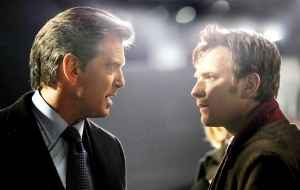 The Ghost Writer is a political thriller directed by Roman Polanksi and based on Robert Harris’ novel The Ghost. An unnamed author (Ewan McGregor) is tasked with completing the memoirs of Adam Lang (Pierce Brosnan) the ex-Prime Minister of the United Kingdom. His predecessor and Lang’s long serving aide died in an alleged accident, but this is far from the first mystery that the author encounters. The film quickly descends into a race to find out the truth, however uncomfortable it may be.
The Ghost Writer is a political thriller directed by Roman Polanksi and based on Robert Harris’ novel The Ghost. An unnamed author (Ewan McGregor) is tasked with completing the memoirs of Adam Lang (Pierce Brosnan) the ex-Prime Minister of the United Kingdom. His predecessor and Lang’s long serving aide died in an alleged accident, but this is far from the first mystery that the author encounters. The film quickly descends into a race to find out the truth, however uncomfortable it may be.
The Ghost Writer delivers on two accounts. Firstly, its a very good film. It is packed full of twists and turns. A sense of mystery and intrigue is heavy and pervades the bleak setting of Martha’s Vineyard. We are always aware that there is something we do not know. The cast is excellent: particularly Pierce Brosnan as Adam Lang. Charming at times, but with a menacing undercurrent. The viewer is kept on their toes, never quite knowing what to make of the ex-Prime Minister.
Secondly, The Ghost Writer delivers with its politics. It is quite clear that Adam Lang is a thinly veiled caricature of real life ex-Prime Minister Tony Blair. We are treated to themes such as the legality of the Iraq War and the ‘special relationship’ between the US and UK. It keeps the film, while a work of complete fiction, current and furthermore gives it an air of legitimacy. As if something like this could actually happen.
The novel that the screenplay was adapted from was on the reading list of my University and it is easy to see why. It is the perfect book, and film, for people who are interested in politics, especially anglo-american politics.
4. In the Loop (2009)
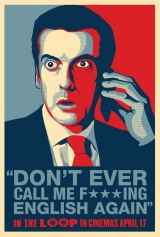 While The West Wing may glamourise politics to absurdity, In the Loop satirises it to the point of credibility. Using many of the same characters as his highly popular television series, The Thick of It, Armando Iannucci presents his view of anglo-american politics complete with bungling British ministers, war mongering American generals and even a ‘dodgy dossier’. The format is the same as the television series with the viewer taking an almost fly on the wall role of the goings on of government officials and politicians. The storyline starts with the Minister for International Development, Simon Foster (Tom Hollander), confusing his governments message on the possibility of a war in the Middle East (at one point saying it is ‘unforeseeable’ and then later saying we may need to ‘climb the mountain of conflict’). He is then plucked by the Americans to be used as a pawn for both the pro-war and anti-war groups. The film centres around the debate on whether to go to war or not.
While The West Wing may glamourise politics to absurdity, In the Loop satirises it to the point of credibility. Using many of the same characters as his highly popular television series, The Thick of It, Armando Iannucci presents his view of anglo-american politics complete with bungling British ministers, war mongering American generals and even a ‘dodgy dossier’. The format is the same as the television series with the viewer taking an almost fly on the wall role of the goings on of government officials and politicians. The storyline starts with the Minister for International Development, Simon Foster (Tom Hollander), confusing his governments message on the possibility of a war in the Middle East (at one point saying it is ‘unforeseeable’ and then later saying we may need to ‘climb the mountain of conflict’). He is then plucked by the Americans to be used as a pawn for both the pro-war and anti-war groups. The film centres around the debate on whether to go to war or not.
In the Loop is satirical comedy of the highest grade. While clearly being a quite absurd version of events, it manages to keep its feet on the ground just enough to carry an element of believability. Tom Hollander plays the clueless minister superbly and Peter Capaldi reprises his role as spin-doctor extraordinaire Malcolm Tucker to great effect. From great one-liners to some of the most creative swearing I’ve ever seen with even a bit of slapstick thrown in (for instance, details of the ‘secret’ war committee are leaked resulting in a heavily overcrowded conference room) In the Loop will keep you lauging.
Out of all the films in this list, In the Loop shows politics and politicians the most faithfully. While at the same time providing brilliant comedic characters and scenes. These combine to give one of the best political films I have ever watched.
3. Hunger (2008)
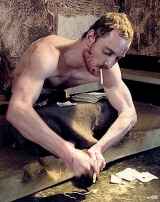 Directed by Steve Mcqueen, Hunger is an uncompromising look at the 1981 Irish hunger strikes in the Maze Prison. Michael Fassbender plays Bobby Sands, a young IRA member who led the second hunger strike and participated in the famous ‘no wash’ protests. The film follows his time in prison as he slowly deteriorates and eventually dies. It shows the struggle of the prisoners to be recognised as political prisoners and not as terrorists. Some have questioned whether it glamourises their position, showing the prison officers and British Government in an unfair light. I disagree with this whole heartedly. The film’s graphic portrayal of their struggle in no way glamourises their position. It may portray them in a favourable light, but this is only because they were treated so harshly.
Directed by Steve Mcqueen, Hunger is an uncompromising look at the 1981 Irish hunger strikes in the Maze Prison. Michael Fassbender plays Bobby Sands, a young IRA member who led the second hunger strike and participated in the famous ‘no wash’ protests. The film follows his time in prison as he slowly deteriorates and eventually dies. It shows the struggle of the prisoners to be recognised as political prisoners and not as terrorists. Some have questioned whether it glamourises their position, showing the prison officers and British Government in an unfair light. I disagree with this whole heartedly. The film’s graphic portrayal of their struggle in no way glamourises their position. It may portray them in a favourable light, but this is only because they were treated so harshly.
Make no mistake, this film is not for the faint hearted. We are shown numerous prisoners being beaten (at one point by guards in full riot gear), and worse than that graphic scenes of the dirty protests. Faeces covered cells, urine irrigated into the corridor. These are the lengths that prisoners went to to protest what they perceived as wrong. The shock factor clearly hits it’s target, but so to does Michael Fassbender’s portrayal of Bobby Sands. Most notably for his ‘Foal’ monologue which was shot in a fixed position for an unbroken 17 minutes. Cunningham and Fassbender temporarily moved in together and practised this scene between 12 and 15 times a day. His clear dedication to the role translates to a powerful and moving performance. Hunger highlights just how important this period in British politics was, and how strong feelings were on either side of the Irish Sea. For a brutally honest and uncompromising look at the belief of the IRA go no further.
2. The Baader-Meinhof Complex (2008)
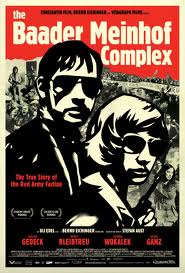 The post-WW2 generation of Germany had a hard time coming to terms with their own country’s history. Some saw it as a chance to start again and prove to the world it was an anomaly. Others, however, could not get over the fact that their own parents were involved in the horrors of the Fascism. The Baader-Meinhof Complex tells the true story of a group of young left-wing terrorists who fought against what they believed to be a West German fascist state. Based on the non-fiction book of the same name we see the creation of the Red Army Faction, it’s arson attacks and bank robberies, and it’s eventual decline with the trial and group suicide of it’s most prominent members. It’s a dramatic re-telling of an extremely turbulent and divisive time in Germany’s post-war history.
The post-WW2 generation of Germany had a hard time coming to terms with their own country’s history. Some saw it as a chance to start again and prove to the world it was an anomaly. Others, however, could not get over the fact that their own parents were involved in the horrors of the Fascism. The Baader-Meinhof Complex tells the true story of a group of young left-wing terrorists who fought against what they believed to be a West German fascist state. Based on the non-fiction book of the same name we see the creation of the Red Army Faction, it’s arson attacks and bank robberies, and it’s eventual decline with the trial and group suicide of it’s most prominent members. It’s a dramatic re-telling of an extremely turbulent and divisive time in Germany’s post-war history.
The groups most prominent members, Ulrike Meinhof (Martina Gedeck), Gudrun Ensslin (Johanna Wokalek) and Andreas Baader (Moritz Bleibtreu) are all played superbly. They are able to bring to life the complete conviction and heartlessness that allowed the group to carry out their operations. That we can understand their motivations is what makes the film a triumph. Clearly West Germany was not a Fascist state, yet these young people believed it to such an extent that they felt comfortable committing murder. The filming, costumes and sets all combine to faithfully recreate the 1970s and 1980s, reinforcing the powerful performances of the three main characters.
There has been much debate over whether the film shows the terrorists in too favourable a light. To some extent, I think this could be true. As I watched it I felt myself getting sucked in and unconsciously willing the protagonists on. Part of this lies in the performances of the actors and part of it lies in the sheer length of the film (149 minutes). However, once the film ended and I set about reading the original book and learning more about the group, I realised how absurd their ideas and views were. For me the group suicide near the end of the film highlights how they lost, and were right to lose.
The Baader Meinhof Complex is a faithful retelling of the story of the Red Army Faction. We see their corrupted ideas and motivations, their bloody campaign against the West German Sate, and their eventual defeat at the hands of justice. This is a great film for an often overlooked piece of political and social history.
1. Die Welle (2008)
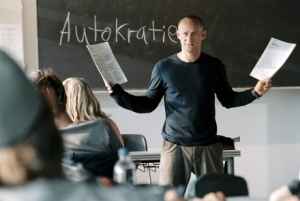 One of the most asked questioned about the rise of Fascism in Germany in the 1930s and 1940s is just how it happened. How did a previously democratic country slip into the grip of an authoritarian regime with it’s people seemingly ignorant to the atrocities carried out in its name. This is the question that Dennis Gansel tries to answer with The Wave. We are introduced to Rainer Wenger, played by Jürgen Vogel, a teacher at a German high school. He is tasked with teaching his class about the concept of Autocracy as part of a project. When his students don’t believe that a dictatorship could once again be started in Germany, he sets out to show them how easily people can be manipulated.
One of the most asked questioned about the rise of Fascism in Germany in the 1930s and 1940s is just how it happened. How did a previously democratic country slip into the grip of an authoritarian regime with it’s people seemingly ignorant to the atrocities carried out in its name. This is the question that Dennis Gansel tries to answer with The Wave. We are introduced to Rainer Wenger, played by Jürgen Vogel, a teacher at a German high school. He is tasked with teaching his class about the concept of Autocracy as part of a project. When his students don’t believe that a dictatorship could once again be started in Germany, he sets out to show them how easily people can be manipulated.
This is a fascinating look at mind and behaviour control through a political and psychological lens. Wenger creates a fully functioning dictatorship with himself as leader. The class wears a uniform, stands to address Wenger, and even have their own salute. However, what starts out as a social experiment (based on a real life experiment called The Third Wave created by Ron Jones) quickly descends into something else, with disastrous consequences. It makes you think very hard about how people can be controlled, as seemingly simple things have big consequences when used in the right way. Overall the film is well structured with the viewer well aware that it is building up to a conclusion. We get to know the students and Wenger very well over the course of the film, which makes the ending even more shocking. This really is a hidden gem and out of the 5 films I have chosen here this is the one that I think everybody should watch. It is one of those films that begins in a fairly light hearted manner but by the end has revealed itself to be a deep and well thought out piece of cinema.
What do you think? Leave a comment.











My biggest problem with The Wave is that there was no real ideology behind The Wave. That was one of the main tenants listed at the top of the movie for a ‘good’ autocratic group. They didn’t believe in anything in particular, there was no motivational driver.
Nice list. Recommending these: The Man who Shot Liberty Valance, Seven Days in May and True Colors.
I haven’t seen any of the films on this list, but I enjoyed reading it. You’ve inspired me to seek them out, particularly Hunger and The Wave. Also nice to see a fellow Sheffield graduate on the Artifice
I’d heard great things about The Ghost Writer so I will try and check it out. Hunger is definitely amazing. Top-notch list.
Absolutely love The Ghost Writer – excellent performances and gripping story, I’m glad it’s been given some attention here.
I like the mention of The West Wing in contrast to In the Loop/The Thick of it. I’ve always thought that The West Wing was always about who is the smartest in the room, whereas The Thick of It was always concerned with the stupidest guys. I think it’s an interesting contrast in the way the USA and the UK see their politics and politicians. There is a lot more idealism in the US generally I beleive, in spite of the fact that the country is divided on most major issues. If you look at the UK, we just believe all of our politicians are morons just begging to be outed as the huge idiots they are…well, that’s the case if you read the newspaper anyway. I think an article contrasting and comparing political films/TV from around the world and how it reflects their country of origin would be very cool indeed. I’d write it myself, but I’m quite the ignoramus, politically speaking.
Thanks for writing this, keep it up!
I was toying with the idea of doing a comparison between The West Wing and House of Cards. How WW presents most people in politics as fundamentally good etc, whereas HoC shows everyone in politics as bad etc. but didn’t think id have enough to write about
That’s an interesting thought though…House of Cards is pretty much in its infancy at the moment, so that will work against you. However, there are other political shows to take into account, even if you just look at certain aspects of them. I think there’s something in writing an article on the representation of politics on TV, it would just be a matter of someone having the patience to take a shot at it.
Again, this was a great read, I’m looking forward to what you do next.
Only watched The Ghost Writer. Great idea, would love to see on focusing on TV shows.
I absolutely loved Hunger and I think I’ll have a look at the others in the list. Great article!
I found Hunger incredibly difficult to watch, but I enjoyed it nonetheless. Fassbender is one of the best actors right now, and this film is further proof of how amazing he is. Some of the scenes are so grotesque that it really gives you an idea of what these people were going through.
This is a brilliant list – I’m intrigued to follow up on these films and like the sound of The Wave – thanks for this!
Just read this again. Die Wielle sounded interesting to me on first read, but looking again I can see an interesting companion piece to it. Check out Michael Haneke’s Das Weisse Band (The White Ribbon) – it takes a different approach to Die Wielle, but it too shows how a society can become embroiled in fascist thinking, but in a more allegorical fashion. Definitely worth a watch. This is one of my favourite lists on the site so far; it’s kept me thinking over the ideas you put forward.
As much as I wanted to like The White Ribbon, I just could not be intrigued by it as much as I wanted to. Haneke has done some great work that I have in my DVD collection but this was not one that spark the right areas for me.
Notes aside, this is a very good article with a very good sum of movies that not all souls have watched.
I watched white ribbon today and found it a hard one. While it kept me watching despite being very bleak, I found that I had to do too much work to realise what he was getting at. Contemplating looking at White Ribbon and The Wave and comparing how WR makes you work to realise the message, whereas The Wave pretty much spells it out for you..
There is a lot of work involved with most of Haneke’s films, but I always find that the juice is worth the squeeze. I’m glad you watched it. My girlfriend and I saw it in a cinema, and the final shot (the church mirroring the seating in the cinema) was amazing, and it was then that I realised what Haneke was trying to say. I think the idea you’ve suggested has even greater significance in its ideas than you might think. The presentation of themes is often stark between one film and the next. Look at how Toy Story 3 presents “getting old” Vs how Haneke’s Amour approaches it. Contrasting and comparing the different ways in which themes like mortality are presented in various films is rife for exploration.
Die Welle and Das Experiment are two very interesting examples of Contemporary German Cinema – both films adapt American events/ experiments into control and order into the context of Modern German history. They seem to refer to changing social consciousness regarding the Third Reich and cultural memory. During the New German Cinema era, filmmakers purposefully acted against American perspectives of their history, now directors are working through these foreign points-of-view.
I have never seen any of the films on this list but all five sound fantastic. Will definitely give them a watch
Brilliant list – as a fan of political dramas the ones I’ve not seen from this list went to my watchlist right away.